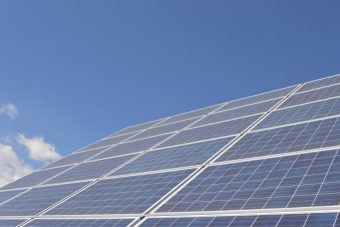
FortWhyte Alive is putting a bright idea to work, tapping into the sun to generate half the electricity needs at its farms.
The 640-acre environmental, educational and recreational centre in southwest Winnipeg unveiled the city’s largest solar panel installation on Thursday.
“As community leaders in sustainability, we believe that harnessing solar power at Fort Whyte makes perfect sense from both an environmental and economic perspective,” said Bill Elliott, the nature centre’s CEO.
“As we face the growing challenges of climate change, we look forward to using this solar farm as a tool to educate the public on the importance of transitioning to clean, renewable energy across the globe.”
The $180,000 system, funded with support from Bullfrog Power, Investors Group and Manitoba Hydro’s Solar Energy Program, will generate enough carbon-free solar power to make up 50 per cent of the electricity consumed at FortWhyte Farms.
That is expected to save FortWhyte Alive approximately $350,000 in energy costs during the 30-year lifespan of the 167 panels.
Solar energy is a trend many Manitobans are starting to follow, prompted in part by a program introduced in April 2016 by Manitoba Hydro.
The utility covers roughly 25 per cent of the upfront capital costs of new installations and also allows home and business owners to sell excess energy back to Hydro.
“The interest in the program has been more than overwhelming,” said Hydro’s Colleen Kuruluk, speaking at the ribbon-cutting ceremony for the FortWhyte Alive installation.
“We’ve had nearly 500 applications in the only 17 months that we’ve been offering the program. This is seven times higher than what we anticipated,” she said.
“It really demonstrated to us that Manitobans were willing and ready to adopt solar technology but perhaps just needed a little more financial incentive to tip that purchase decision.”
Earlier this year, a dairy farmer in southern Manitoba installed the largest solar energy system in the province.
Hans Gorter’s 540-panel system cost 500,000 but was aided by a $175,000 rebate through a program offered by Manitoba Hydro.
It is expected to generate close to 200,000 kilowatt hours of energy annually, drop his annual energy consumption to net zero and be paid off in the next eight to 10 years.
In January, folk singer and artist Heather Bishop installed 64 panels in the yard of her rural southern Manitoba home.
Driven by Hydro’s incentive plan, Bishop’s setup cost about $58,000; her part of the bill was about $40,000.
By the end of that same month, she had actually generated and sent Hydro more power than she used.
Source: cbc.ca



